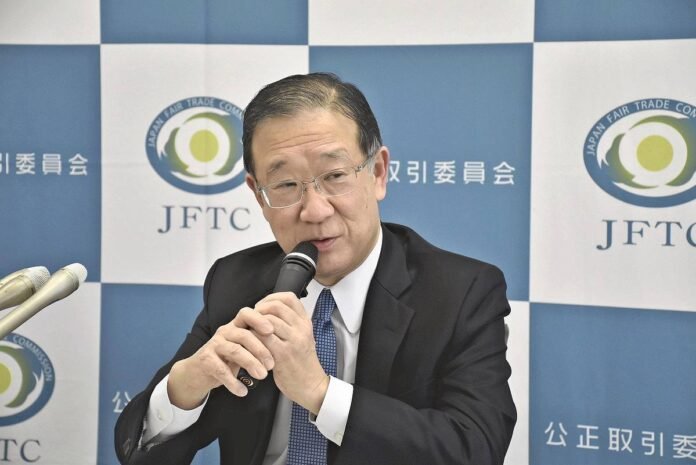Kazuyuki Furuya, chairman of Japan’s Fair Trade Commission, speaks at a press conference in Tokyo following the Cabinet’s approval of the bill for the Law on Promotion of Competition in Specific Smartphone Software.
6:00 JST, April 28, 2024
A bill recently approved by the cabinet to regulate IT giants is mainly intended to target Apple Inc. to force its App Store on its iPhone devices to compete with other app marketplaces, ending Apple’s monopoly on the market for mobile apps for iPhone users.
The government aims to have the bill passed during the current session of the Riksdag. But Apple is poised to block its passage and step up its lobbying of lawmakers in both the ruling and opposition parties.
The battle between the government and Apple is likely to intensify as the current Diet session ends at the end of June.
Warning about Bill’s ‘danger’
“Apple has not given up on preventing the bill from coming into law. Fires are being set in several places,” a government official expressed alarm as the discussion on the issue within the ruling Liberal Democratic Party reached its main stage in mid-April.
According to the official, Apple is stepping up its lobbying of key lawmakers in both the ruling and opposition parties, including the LDP, highlighting the “danger” of the new law.
Prime Minister Fumio Kishida’s visit to the United States this month marked a calm before the storm. Kishida held a summit with President Joe Biden in Washington on April 10. That evening there was a state dinner at the White House, to which Apple CEO Tim Cook was also invited.
It was not until the evening of April 11, Japan time, that the LDP put the procedures for the bill into full swing. “It was the right time to avoid any impact on the summit,” said an LDP official, explaining that the postponement was intended to avoid adverse circumstances such as the US side showing displeasure over the bill.
However, this has made the timetable for the bill’s entry into force uncertain, leaving little time before the end of the parliament session, scheduled for the end of June.
If parliamentary deliberations stall, the bill’s passage could be jeopardized. One administration official said Apple is aware of this and is therefore “trying to delay the procedures for the bill as much as possible to avoid its passage during the current Diet session.”
Resistance
Apple began full-fledged lobbying against the antitrust rules around 2022, when the government accelerated the relevant discussion process. Apple has campaigned vigorously against the regulations, claiming that allowing other app marketplaces on the iPhone would reduce the device’s security.
The government also showed some attention. In the latest proposed regulations, Apple will be able to take the necessary measures to ensure security. It envisions steps such as allowing Apple to explore new mobile app stores.
Yet Apple remains opposed. Some in the app industry calling for the new regulations are even saying, “Apple is using ‘security issues’ as a way to deflect the new rules.”
Such an opinion is also remarkable abroad. When the U.S. Department of Justice filed a lawsuit against Apple for antitrust violations, it criticized Apple for using privacy and security concerns as a shield for its business interests.
‘Tenant farmers’
Behind the government’s decision to tighten regulations lies the market structure involving global IT companies and the Japanese software service providers that become “subcontractors” to them.
Takamasa Kishihara, director of the Mobile Content Forum, an app industry group, points out: “There is a huge difference in the balance of power between Apple and Japanese app distributors, with the Japanese companies being in as weak a position as they are said to be. .” digital tenant farmers.’”
The apps that developers offer – often for free – to iPhone users contribute to iPhone sales. Despite this, developers have to pay commissions of up to 30% for in-app transactions, through Apple’s mandatory payment system. Smaller software service providers’ dissatisfaction with such a reality runs deep.
A senior official of the Japan Fair Trade Commission (JFTC), which would have jurisdiction over the new law, said: “Since IT giants are major business partners for Japanese IT companies, the Japanese companies cannot directly complain to the global companies, even if they do terrible things to Japanese IT companies. The new law aims to empower these vulnerable Japanese IT companies and create a fair business environment.”
JFTC Chairman Kazuyuki Furuya emphasized during a press conference on Friday: “We should strive to pass this bill into law during the current parliamentary session.”



